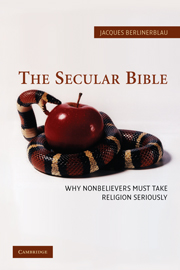Book contents
- Frontmatter
- Contents
- Preface and Acknowledgments
- Introduction: Secularists and the Not Godless World
- PART ONE THE COMPOSITION OF THE HEBREW BIBLE
- 1 “Who Wrote the Bible?”: Ancient Responses
- 2 “Who Wrote the Bible?”: Modern Responses
- 3 A Secular Answer to “Who Wrote the Bible?”
- PART TWO THE INTERPRETERS OF THE HEBREW BIBLE
- PART THREE POLITICS AND SCRIPTURE
- Conclusion: Beyond Church and State: New Directions for Secularism
- Notes
- Index of Biblical Citations
- Index of Qur'ānic Citations
- Index of Rabbinic, Early Jewish, and Patristic Citations
- Index
2 - “Who Wrote the Bible?”: Modern Responses
Published online by Cambridge University Press: 05 June 2012
- Frontmatter
- Contents
- Preface and Acknowledgments
- Introduction: Secularists and the Not Godless World
- PART ONE THE COMPOSITION OF THE HEBREW BIBLE
- 1 “Who Wrote the Bible?”: Ancient Responses
- 2 “Who Wrote the Bible?”: Modern Responses
- 3 A Secular Answer to “Who Wrote the Bible?”
- PART TWO THE INTERPRETERS OF THE HEBREW BIBLE
- PART THREE POLITICS AND SCRIPTURE
- Conclusion: Beyond Church and State: New Directions for Secularism
- Notes
- Index of Biblical Citations
- Index of Qur'ānic Citations
- Index of Rabbinic, Early Jewish, and Patristic Citations
- Index
Summary
And then, this original: it was not actually an original; not the original, when you come to look at it. It was itself a copy of a document out of God knows what distant time; upon which, then, though without precisely knowing where, one might rest, as upon a true original, if it were not itself provided with glosses and additions by the hand of the scribe, who thought thus to make more comprehensible an original text lying again who knows how far back in time; though what they probably did was further to transmogrify the original wisdom of his text.
Thomas Mann, Joseph and His BrothersIn the modern era, Moses the Author has been definitively — and rather ignominiously — shunted aside. The same fate has befallen an assortment of dubious monoauthorist surmises and irrational beliefs about the composition of Scripture inherited from Semitic, Hellenistic, and Latin antiquity. Contemporary scholars do not generally accept that Moses, bespectacled and sitting at the foot of Mount Sinai, penned the tale of Noah's ark. They do not maintain that Solomon composed the Song of Songs after toweling off. Nor do they often believe that — poof! – biblical texts were created effortlessly, sweatlessly, quickly. As for divine origins, well let's just say that it might be an act of grace to not ascribe various books of the Hebrew Bible to God or the Holy Spirit.
- Type
- Chapter
- Information
- The Secular BibleWhy Nonbelievers Must Take Religion Seriously, pp. 30 - 41Publisher: Cambridge University PressPrint publication year: 2005



